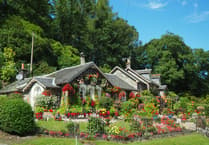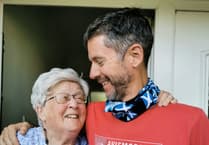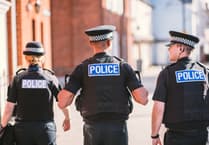WOKING’S Shah Jahan Mosque has had a number of important visitors over the years, such as the once well-known Emperor of Ethiopia, Haile Selassie.
Selassie was emperor from 1930 to 1974. His strong views led him to Ethiopia becoming a charter member of the United Nations. However, when he visited Woking on 26 August 1936 he was in exile in Britain as Ethiopia had been invaded by Italy under its fascist dictator, Benito Mussolini.
The News & Mail reported the visit, saying: “The large company which gathered on the lawn in front of the Memorial House included men and women of black and white races, several of whom wore picturesque native costume, and a number of Woking residents who had accepted the Imam’s invitation.
“The Emperor of Ethiopia, who had been staying in Bath, had travelled to London in the morning, and came on to Woking by road. He arrived at the mosque at 3.15pm, being accompanied by Dr Martin, Ethiopian Minister in London, and Ras Kassa.
“On alighting from his car Haile Selassie, wearing a black cloak, was received by Madam Khalida Buchanan-Hamilton, the president of the British Muslim Society, who presented a bouquet to him. Bouquets of carnations were also presented to the Emperor by two children in Scottish dress.
“Sir Abdullah Archibald Hamilton, in the full dress of his clan, who read an address of welcome from the Muslim community, was accompanied by his personal pipers, in tartan dress, who played on the bagpipes as the Emperor arrived.”
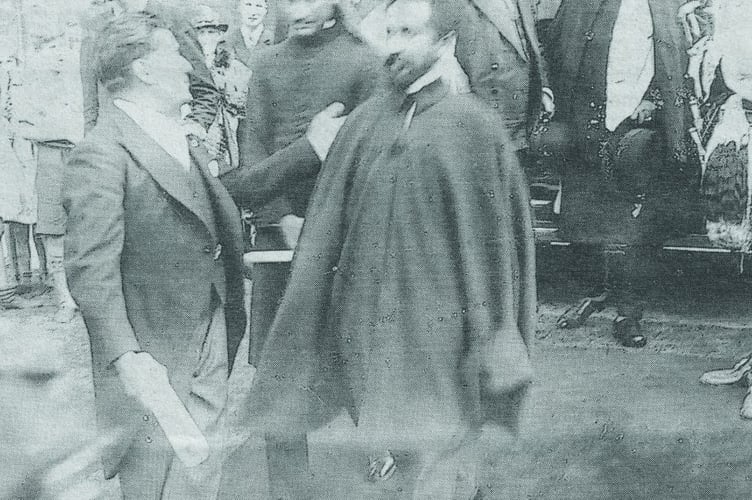
The Scottish theme noted in the news report can be linked to Sir Abdullah Archibald Hamilton. Born Charles Edward Archibald Watkin Hamilton in 1876, he inherited the 3rd and 5th baronetcies of his family upon the death of his father in 1915. He was a descendant through marriage within his family of Princess Mary Stewart of Scotland, daughter of James II of Scotland.
He converted to Islam in 1924, and interestingly was a member of Sir Oswald Mosley’s British Union of Fascists for a brief time in the 1930s.
Haile Selassie replied to the address given to him with his words being interpreted for him. He said, according to the news report: “We tried our best to protect our country and our independence, and now we can only wait for the judgement of the world. You having called me and invited me to this reception is a sign of your sympathy, and we are very grateful to you for showing your sympathy in this way. We trust in God that He will in the end give us justice, and that there will be peace in the world and brotherhood amongst the people.”
Everyone then enjoyed tea in a marquee and the emperor later entered the mosque for a short prayer. He was also presented with a copy of the Holy Koran by the imam.
An earlier VIP to visit the Shah Jahan Mosque on 9 October 1925 was The Begum of Bhopal, Nawab Sultan Jahan Begum. At the time she was the regal ruler of the state of Bhopal, India, under the British Raj. However, she abdicated the Bhopal throne the following year.
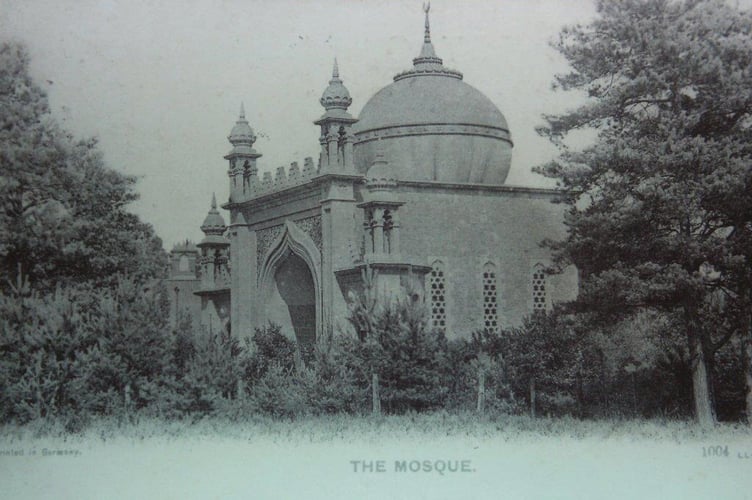
In reporting her visit the News & Mail wrote that she: “…motored from London, accompanied by her three grand-daughters. Her Highness, who was closely veiled, wore a turban and a robe of jade green satin.”
It added that she was presented with a framed photograph of the mosque. She replied to the address given to her “in clear tones, reading from [a] manuscript, penned in the strange characters of her own language, which was afterwards translated”.
There was another VIP visit on 19 February 1939 by Crown Prince Faisal of Saudi Arabia. He later became King of Saudi Arabia from 1964 to 1975. He was in London at the time for a conference on Palestine.
Once again, reader Mark Coxhead kindly assisted with some research into this week’s page.
If you have some memories or old pictures relating to the Woking area, call David Rose, on 01483 838960, or drop a line to the News & Mail.
David Rose is a local historian and writer who specialises in what he calls “the history within living memory” of people, places and events in the west Surrey area covering towns such as Woking and Guildford. He collects old photos and memorabilia relating to the area and the subject, and regularly gives illustrated local history talks to groups and societies. For enquiries and bookings please phone or email him at: [email protected]

